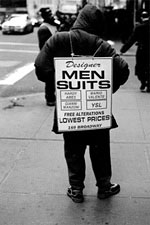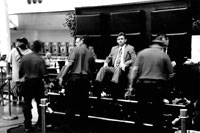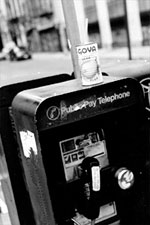
Dave Harris has spent his school year organizing for Earth Week 2000 at University of California, Berkeley, where he is a student.
Monday, 10 Apr 2000
BERKELEY, Calif.
It’s 5:45 in the morning. I’m possibly the only person awake in my eight-story dormitory. My roommate is definitely asleep. I’ve been up all night piecing together the final text of the program guide to Earth Week 2000, University of California, Berkeley. All 2,500 words will be sent to the graphic designer in a few hours to be laid out and printed by tomorrow evening. Eight thousand copies, 100 events in each 16-page booklet. If the hard labor I’ve put in over the last 10 months of my life can affect 8,000 people, it will all be worth it …
Or will it? I’ve been thinking about my approach to activism quite a bit lately, and recently I’ve come to see Earth Day organizing as the shotgun approach to making a difference in the world. Plan the biggest possible event you can dream up, get some celebrities, drop some names, drag in a few thousand people, show them a good time, freak out some politicians and businesspeople, and then … back to life as it was.
I’m willing to bet that more than a few of the people reading this have also spent a good chunk of time dedicated to creating an event not all that different from mine. I don’t mean to discourage anyone, but I do mean to get you to start asking some questions. Is it more important to change a lot of people in a little way, or to change a few people in a very big way? Will real change in the world ever take place if it takes a Leonardo DiCaprio to get people to listen?
Before I get into this any further, I should probably tell you a bit about myself. I’m a freshman at the UC Berkeley, and I used to think I was majoring in environmental economics and policy. I started an environmental club at my high school two years ago and I’ve been an activist since. I grew up in the boorish and monotonous suburbia known as the Silicon Valley (the land of the shallow and wealthy) and breezed my way through public education and somehow landed myself in a dorm room smaller than my dad’s cubicle, where I sit and type this morning.
I’m 19 years old and I’m afraid that I’m starting to look even older. The half dozen all-nighters I’ve pulled in the last three weeks are starting to take their toll on my demeanor. Being a full-time activist and a full-time student at the same time is difficult, but working double-time on both can be downright exhausting.
Because I need to contact working people in outside organizations, I spend every hour of my weekdays (when I’m not in a class) in my room making and receiving phone calls, and constantly playing catch-up. It seems like at the end of the day I’ve never finished everything I wanted to and I’ve got another dozen things to add to the list …
So. On with the show. Brought to you from the front lines of college activism, here at the place where it all started back in the sixties, Dave Harris, live at ground zero, contemplating the very nature of activism at the same time as he makes the final preparations for “A Weeklong Celebration of Environmental Education, Action, and Expression.”
As the week rolls by, you can look forward to more late-night pontifications, frustrations, tales of desperation, and reflections on what’s coming up next week: a former chief economic advisor to President Clinton, an environmental minister from San Francisco’s Grace Cathedral, a Texas cattle rancher turned vegan activist, a U.S. Senate candidate, a world renowned tree-sitter, a poet laureate emeritus of the United States, a professional ruckus-maker, an environmental rapper, a handful of CEOs, dozens of PhDs, musicians, authors, students, artists, and activists. I’m also planning to confront the topics of race and class within the environmental movement, how issues of social justice are becoming increasingly united with environmental struggles, and where the environmental movement needs to go if it wants another generation to hop onto the bandwagon. If I’m in the mood, I may even share some of my art that I’ve been working on over the past semester, for your viewing pleasure.
The sun is up and I have to be in class in less than an hour. Wish me luck — I’ll need it! (Did I mention my two midterms on Thursday?) Bye for now.
Tuesday, 11 Apr 2000
BERKELEY, Calif.
I did something out of the ordinary today. Instead of rushing home after my art lecture to make Earth Week phone calls before people leave work for the day, I stuck around to talk to my professor. I’d been meaning for a while to show him the last piece I finished — a three-minute-long derivé, captured in the medium of digital video and set to the backdrop of DJ Spooky’s gut-thumping rhythms and techno sound-bite cut-ups.
The video was the final product of eight hours of shooting and another 20 hours of editing … A lot of time if you think in terms of the modern linear film, but not nearly as much if you imagine the finished product to be more closely related to a painting that a viewer would stare at for a minute or two in a gallery. In my video I presented a fast-paced tour of urban San Francisco, from the United Nations Plaza to Chinatown, then on to the Museum of Modern Art, the shopping malls, and much more. The images that I chose to present gave a critical look at modern urban space and the impact that it has upon both the natural world and the human psyche.

Photo: Dave Harris, © 2000.
After showing the video to my professor, he was curious to see my other work, some of which I luckily happened to have with me. I pulled out two mini-albums of black and white photographs that I took in Washington, D.C., and Manhattan a few months ago. I was in D.C. for a Sierra Student Coalition conference, and afterwards I decided to pay a visit to a friend of mine at Columbia University in New York City. The experience was a strange one.
Having never spent an entire week in such an extreme urban environment, I began to feel very out of touch with my body. I was coughing everywhere I went, and I just generally felt trapped, even in Central Park. It makes me truly sad that at the technological apex of our modern civilization, people become so jaded and out of touch with the real world that Central Park seems like nature to them. You can’t find anywhere in the park out of sight of a fence or a statue. Even the rocks are artificial. I read somewhere that each and every stone in the park, from the tiniest gravel to the most gigantic boulder, was brought to the park based on the exact specifications of the designer.

Photo: Dave Harris, © 2000.
I also paid a visit to the Guggenheim Museum, where I got a chance to see a retrospective on the work of Nam June Paik, an artist with whom I have since fallen in love. His artistic experiments oftentimes focus upon televisions or other electronic devices and he manipulates them in order to create art. My favorite piece was a jungle of potted plants that had dozens of TVs of all shapes and sizes planted within it, staring back at the viewer in some sort of yearning for release.
When I make art, I’m constantly faced with the question of whether I’m being too political or trying to advance too much of an agenda. Fine art, as my professor says, “creates possibilities for interpretation,” which separates it from low art, such as advertising, which is only design
ed to generate a specific reaction that benefits the artist’s client. I’m constantly battling between screaming at people something like, “Material possessions will never make you happy!” or “Start caring about something other than yourself!” and the aesthetic temptations of abstract expression. These are three of my most recent works in today’s column. Hopefully they may give you a bit more of an insight into what makes the activist in me tick. But maybe they’ll just make you wonder … I’d love to hear some feedback.

Photo: Dave Harris, © 2000.
Well, it’s 3:45 a.m. now, and I’ve only managed to grab three hours of sleep since my last entry. The Earth Week program guide has (almost) made it to the printer, and by the end of the week we’ll hopefully have a few thousand copies in hand. Now that our more than 100 events have actually been confirmed, I’m planning to dedicate most of my time to publicity, something we’re sorely lacking. I’ve had so many frustrations working on Earth Week this year, but it still has the potential to make something incredible happen.
All of the sleepless nights and bad grades it’s netted me over the last 10 months will be brought to final judgement in less than two weeks. It’s sad, but I think that the outcome of this event — the result of hundreds upon hundreds of hours of my life and energy — will be the major factor in determining my future as an activist. If it flops, I can’t possibly imagine myself ever having the energy to do something like this again. We’ll soon find out. Enjoy the photos!
Wednesday, 12 Apr 2000
BERKELEY, Calif.
The geeks next door start to drool when new computer software hits the market. The girls across the hall go shopping at the Gap after each of their midterms to relax. The frat boys down the street seem to live in an endless cycle of half-assed school work during the week and bleary-eyed weekends of drunken debauchery. The most exciting part of my month is getting the new issue of Adbusters in the mail and the ensuing two hours of mind-bending subversive ideology that gets poured into my brain.

Photo: Dave Harris, © 2000.
Why is that? Why do I love to muse about changing the world in ways that I perceive to be for the “better,” while the overwhelming majority of my peers dedicate their full energies to materialistic self-indulgence? Many activists, myself included, tend to lean toward the belief that our perspective is in some way “enlightened” or just inherently superior, and that some people have seen the light and others haven’t. I often find myself trying to define the underlying goals behind my activism and can’t help but think how much I must sound like some kind of religious extremist nut to about 95 percent of the people in the world.
Why am I an activist? I ask myself that question frequently. If I’d been raised to believe that everything is fine the way it is and that my place in the world is as a humble part of our glorious industrial machine, would I really give a damn about biodiversity and global climate change? When I was 16 one of my friends caught me saying, “When I grow up, all I really want to do is make a lot of money and live in a really big house.” My, how things have changed …

Photo: Dave Harris, © 2000.
Do people really do anything more than what the world tells them to do? Am I an activist now because I achieved some level of critical thinking ability, which enabled me to reevaluate my value system and come to the conclusion that it is my ethical imperative to change the world? Or was it just that enough people and posters and magazines told me that I should care about different stuff than I cared about before?
Last week the PIRG (Public Interest Research Group) state organizer was in Berkeley and he told me that I was one of the most entrepreneurial student-activists he’d ever met. I was a bit honored and a bit tickled at the same time. He was responding to my telling him that I wasn’t really planning on doing Earth Week next year at Berkeley.
I grew up in a family business that blossomed and then collapsed over the course of the first dozen years of my life. Without a doubt, it had an impact on me. The business was a toy store and before I made it to the double-digits I was helping out around the place — telling customers which games I liked, counting money in the back room with my dad, helping my mom order children’s books. A dream world for a child of the ’80s — I can still hear Madonna singing about my “material world.” There’s something about what I’m doing today that makes me feel like I’m surfing the same wave that my parents surfed in the ’80s.

Photo: Dave Harris, © 2000.
Although the world of Earth Day is rooted in something very different than that of retail, they share a common thread — hubris. You find something you want to do and you make it the biggest, best, most incredible thing that’s ever been done like it. When it comes to the end of the day, you judge yourself on how far you perpetuated your short-term goals, but you can never quite remember why exactly you’re doing it. Something about trees or changing how people think, or something like that.
It’s almost 3:00 a.m. and I haven’t even begun to study for my two midterms coming up on Thursday. I’ve got class in six hours and I can be sure that it won’t be an easy day. I’m going to have to figure out 1) how to do all my economics problems that will be on the midterm, which should be pretty easy, and 2) how to learn enough about hydrology and water politics to write about it for three hours.
It really feels healthy for me to get all these thoughts down on paper … Actually, now that I think about it for a second, it seems that there’s only a small chance that these words will ever make it onto paper. What an interesting world we live in. Tomorrow you can look for a diatribe on human rights and the environment and the phenomenon of their unification. I’ve left you with a few more of my photos.
Thursday, 13 Apr 2000
BERKELEY, Calif.
Yesterday I sat down to study for my American Studies midterm with a girl from my class, and as she opened her binder, I saw that she’d gone to the Earth Week website and planned out her whole week around all of the speakers that she’d wanted to see. It was probably the most exciting thing that happened during my day, considering that I spent four and a half hours taking midterms and on top of that got personal phone calls from both Gary Snyder and Lawrence Ferlinghetti saying that they couldn’t make it to Earth Week. Oh well … At least I did decently on the midterms.

Photo: Dave Harris, © 2000.
Back in October, our Earth Week group had a long discussion about what Earth Day has been in the past and what we want it to be at UC Berkeley today. In student-activist circles, there has always been a lot of cross-fertilization between human rights and environmental activism. The question we tried to answer was whether or not Earth Week was the ideal place for both.
Our general consensus was that we’d make Earth Week open to anyone who wanted to present and encourage interpretation of the week’s subject m
atter as broadly as possible. Now that our whole schedule is done, it looks like the week is about 60 percent traditional environmental topics, 20 percent purely human rights, and another 20 percent borderline or both. This is definitely to be expected, given the nature of Earth Days past, but it makes me wonder about the future of these two movements.
Last year at the WTO protests in Seattle, it was clear that social justice and environmental protection were the two key issues at hand. I’d be willing to bet that you wouldn’t have been able to find a single environmentalist on the streets who didn’t think that more human rights work needed to be done, and vice versa. Everyone knows that to be effective, you really must choose your battles (something I’m not very good at) and break things down to a manageable size so that you can develop some type of clear goal (another thing I’m not good at).

Photo: Dave Harris, © 2000.
My first jump into activism took place during the summer after my junior year of high school. Due to some strange stroke of fate, I ended up on the other side of the world with a dozen other Jewish teens from the Bay Area being shuttled around Israel. We did habitat restoration work in a swamp where irrigation attempts had poisoned wetlands, taught art to students from a school for mentally and physically disabled children, and met with Arab youth and Israeli politicians to discuss the state of affairs in the Middle-East and what we could do about it. The real change, though, took place after the trip, when I spent a week on my own, my home base a ranch on the Red Sea that belonged to a friend of my uncle. I took a four-day hike with a group of mostly college students through the deserts of Egypt and then spent a day with one of the girls I met on the trip exploring the ancient city of Petra, Jordan. To top it all off, I spent most of that summer reading some fairly subversive literature — Steinbeck’s East of Eden, Kerouac’s Dharma Bums, Heinlein’s Stranger in a Strange Land — which surely shaped my perspective of the trip.
When I began to see the world from outside of the Silicon bubble I’d grown up in, I realized that air and water pollution were more than just invisible myths, and that there really were poor people in the world who didn’t have anything to eat. Despite the extreme degree of naïveté that characterized my consciousness throughout the voyage, it got me started asking a lot of questions about who I was, what I needed to do about it, and all the craziness going on in the world.

Photo: Dave Harris, © 2000.
I’m not sure exactly what drove me to become an environmentalist before a humanitarian — maybe just a general sense of misanthropic disgust with my species, or maybe the idea that the damage that we’re doing today to the earth is irreparable. In many ways, it seems that a world of social equity, although far from present, is within the grasp of the dominant modern worldview, whereas a lasting peace with our physical existence in the world is far from being within our mental grasp.
At the same time, it seems silly and even heartless to fight against invisible problems when I walk past homeless and hungry people every day on my way to class. I’ll have to sleep on this one and give you more thoughts tomorrow. Again, here are some pictures for your contemplative pleasure.
Friday, 14 Apr 2000
BERKELEY, Calif.
I spent all day stuffing envelopes in a valiant attempt to get out 100 massive packages of brochures and posters — and then found out that the post office closes at 4:00, not 5:00, so I’ll have to wait until Monday to mail them all.
For the last few weeks I’ve been in that unbearable state of existence where when you get woken up from sleep only for a little bit, hundreds of thoughts begin to spin through your head about everything that you should really be awake and working on.

Photo: Dave Harris, © 2000.
I had a nightmare last week that only a handful of people showed up for each of our events, almost all of which were friends of mine, or the specific people who I’d told we’d have huge crowds. Maybe it was a dumb idea to keep accepting new workshop leaders after we got one for each 90-minute block. Maybe it was even dumber when I let each block make it up to six events. The dumbest thing was probably just not thinking enough about how many people really want to learn about this kind of thing.
I see posters all the time for events I’d love to go to, but can never make it. I really hope that’s not how Earth Week ends up — that week at Berkeley with the cool brochure that I didn’t have time to make it to. It seems like there’s not a single college student I know who really has time to do anything more than what they’re already doing. I really hope I’m just entering a temporary state of unneeded stress attacks, and that hundreds of people already have their calendars marked and can’t wait to come to Earth Week.

Photo: Dave Harris, © 2000.
I’m leaving this diary at a juncture that, as I mentioned in an earlier column, will probably have an incredible impact on where I end up in life. I’m about to embark on the most insane two weeks of my life. My dad offered me his cell phone yesterday, to borrow for Earth Week. It felt like some kind of sick rite of passage — son follows father into the world of electronic prosthetics so that his life can revolve around missed deadlines, constant connectedness to the powers that be, and the endless pursuit of increased productivity.
The sad thing is that despite the hundreds of disparaging comments I’ve made in my life about cell phones, pagers, Palm Pilots, and the like, I really was tempted to take that phone. Tempted to dive into a world that will fly by me in a fit of blurred neon and spinning sirens and dump me on the sidewalk at age 40 wondering what happened. The only consolation is that over the course of that harried voyage, I just might be able to slow down the whirlwind a little bit and send it headed in a slightly different direction.


